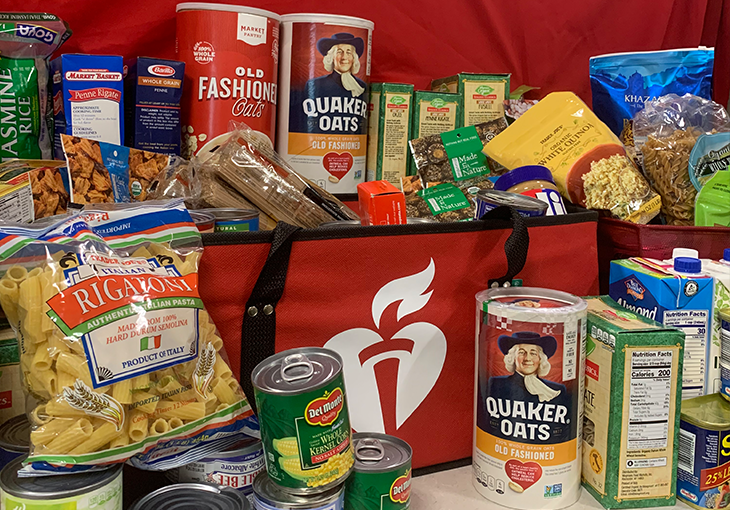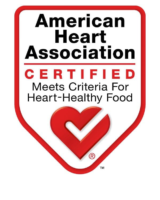The American Heart Association teamed up with JPMorgan Chase this summer and fall to provide healthy food to people in Greater Boston that need it most.
Nineteen Chase branches throughout the region collected nonperishable, healthy food items that the American Heart Association is donating to organizations serving under-resourced communities in Boston.
The food drive was part of the American Heart Association’s efforts to increase access to healthy food throughout the city.
Studies show that adults in households that can’t regularly buy nutritious foods are more likely to develop heart disease or have a stroke. Those facing food insecurity are also more likely to have high blood pressure and diabetes, both risk factors for cardiovascular disease.
Heart disease is the No. 1 killer of all Americans. Stroke is the No. 5 cause of death nationally and a leading cause of disability.
“Too many Americans live in homes that don’t always have enough food for everyone in the family,” said Keith Slattery, market leadership team managing director at JPMorgan Chase and chair of the 2020 Boston Heart Walk. “The social and economic impact of COVID-19 has heightened this problem, particularly in under-resourced communities. JPMorgan Chase is investing the American Heart Association to help close these gaps.”
The food drive was conducted in the lead up to the Boston Heart Walk, which was held virtually the week of October 19. JPMorgan Chase is the Food Access Sponsor of this year’s walk.
A red bin emblazoned with the American Heart Association heart and torch logo was placed in the lobbies of participating Chase branches. Food donations included non-perishable items with the lowest amount of sodium, added sugars, saturated fat and trans fat.
This included whole-wheat pasta, canned tomatoes, tomato sauce/spaghetti sauce, canned vegetables, dried fruit with no sugar added, canned fruit in own juice or lite syrup, canned or pouched chicken and seafood packed in water, canned and dry beans, peanut butter, broths (chicken, beef or vegetable), canned soups, dried herbs and spices. Look for the Heart-Check mark, the front-of-package icon of the American Heart Association’s Food Certification Program, for guidance.
Collected food will be donated to local community centers and food pantries based on need. Sites slated to receive donations include Roxbury Tenants of Harvard, which operates about 1,000 affordable housing units in the Longwood/Mission Hill area of Boston; Boston Centers for Youth & Families, a network of community centers serving the city; and Fathers’ Uplift, a Dorchester-based organization that helps dads overcome obstacles that may prevent them from being a part of their kids’ lives.
“In Boston, one in five residents often don’t know where their next meal is coming from,” said Jay H. Blackwell, executive director of the American Heart Association in Boston. “This has serious, long-term health implications for thousands of residents who can’t regularly buy nutritious food. This is why the American Heart Association is working to increase access to healthy food in our city.”
The causes of food insecurity are often the result of where an individual grows up, works and lives. These social, economic and environmental factors, known as the social determinants of health, are better predictors of well-being than any one factor alone.
The food drive is part of a larger American Heart Association strategy to ensure that everyone in Boston has access to affordable, nutritious food. This strategy also includes spearheading projects, supporting organizations and advocating for policies that can change neighborhoods and improve the lives of everyone there.
The American Heart Association will hold a second food drive at participating Chase branches in early February 2021 to coincide with Wear Red Day, the first Friday of every February in which the nation comes together to raise awareness of heart disease and stroke.
Chase branches participating the food drive:
• Belmont; 7 Channing Rd.
• Chestnut Hill; 21 Boylston St.
• Chinatown, 43 Kneeland St.
• Commonwealth Ave., 880 Commonwealth Ave.
• Coolidge Corner; 1364 Beacon St.
• Downtown Crossing, 425 Washington St.
• Hingham, 92 Derby St.
• Huntington Ave., 280 Huntington Ave.
• Jamaica Plain, 701 Center St.
• Lynnfield, 230 Market St.
• Newton Centre; 776 Beacon St.
• North End, 48 Salem St.
• Peabody, 210 Andover St.
• Roxbury, 7 Palmer St.
• Somerville Assembly Row, 702 Grand Union Blvd.
• South End; 345 Harrison Ave.
• Watertown; 550 Arsenal St.
• Westwood, 670 High St.


